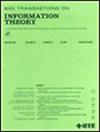Split-State Non-Malleable Codes and Secret Sharing Schemes for Quantum Messages
IF 2.2
3区 计算机科学
Q3 COMPUTER SCIENCE, INFORMATION SYSTEMS
引用次数: 0
Abstract
Non-malleable codes are fundamental objects at the intersection of cryptography and coding theory. These codes provide security guarantees even in settings where error correction and detection are impossible, and have found applications to several other cryptographic tasks. One of the strongest and most well-studied adversarial tampering models is 2-split-state tampering. Here, a codeword is split into two parts which are stored in physically distant servers, and the adversary can then independently tamper with each part using arbitrary functions. This model can be naturally extended to the secret sharing setting with several parties by having the adversary independently tamper with each share. Previous works on non-malleable coding and secret sharing in the split-state tampering model only considered the encoding of classical messages. Furthermore, until recent work by Aggarwal, Boddu, and Jain (IEEE Trans. Inf. Theory 2024 & arXiv 2022), adversaries with quantum capabilities and shared entanglement had not been considered, and it is a priori not clear whether previous schemes remain secure in this model. In this work, we introduce the notions of split-state non-malleable codes and secret sharing schemes for quantum messages secure against quantum adversaries with shared entanglement. Then, we present explicit constructions of such schemes that achieve low-error non-malleability. More precisely, for some constant求助全文
约1分钟内获得全文
求助全文
来源期刊

IEEE Transactions on Information Theory
工程技术-工程:电子与电气
CiteScore
5.70
自引率
20.00%
发文量
514
审稿时长
12 months
期刊介绍:
The IEEE Transactions on Information Theory is a journal that publishes theoretical and experimental papers concerned with the transmission, processing, and utilization of information. The boundaries of acceptable subject matter are intentionally not sharply delimited. Rather, it is hoped that as the focus of research activity changes, a flexible policy will permit this Transactions to follow suit. Current appropriate topics are best reflected by recent Tables of Contents; they are summarized in the titles of editorial areas that appear on the inside front cover.
 求助内容:
求助内容: 应助结果提醒方式:
应助结果提醒方式:


